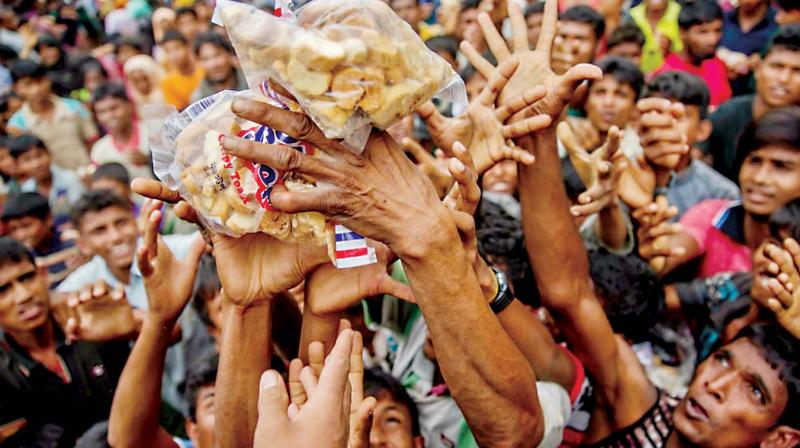Wide Angle: Rohingya crisis - Is there a Saudi role?

He sat at the head of a long dining table, donning the grandest headgear, a combination of turban and hat, with neat, cascading pleats. Grand Mufti Ahmed Bader Eddin Mohammad Adib Hassoun, Syria’s highest religious authority, held the ambassadors and a sprinkling of journalists in his thrall. It was an unstoppable torrent. Unable to get a word in edgeways, the guests attended, with dedication, to the sort of elaborate feast which has gone out of fashion in this era of spartan hospitality even in diplomatic circles. That the Mufti was not on a mission of religious sightseeing alone was clear from his itinerary. He had quality time with home minister Rajnath Singh and travelled to Srinagar to meet chief minister, Mehbooba Mufti. The office of the National Security Council discussed in some detail West Asia and Rohingya refugees. According to him, the running Rohingya-Buddhist conflict is being aggravated by the US-Saudi combine to serve their interests — to transform the moderate, Sufi-inclined Rohingyas into Salafi groups. These would help destabilise a country neighbouring China. Evidence of Rohingya Muslims in Myanmar’s Rakhine state since the 7th century is not accompanied by a narrative of harmony with the Buddhist majority in that country throughout this period. But since 1970-80, increased repression, economic deprivation and denial of citizenship rights could possibly be because of the reverberations following the Iranian revolution in 1979.
Saudi Arabia, particularly shaken by the emerging, bipolarity in the Muslim world, took the lead in drumming up an anti-Shia hysteria. Over time, Sufi Islam was also in the line of fire. Riyadh had an interest in diverting the world’s attention towards Iran because a much bigger danger had reared its head within Saudi society. An anti-monarchy, radical, Islamic group had occupied Islam’s most important mosque in Mecca for weeks almost at the same time as the Iranian revolution. The Saudis needed to create Wahabi enclaves wherever they could. This brief background is essential to understand the antecedents to the current exodus of over 400,000 Rohingyas. Americans no longer deny that they have from time to time fallen back on militants or terrorist groups as tactical assets. In an interview to Christiane Amanpour, Russian foreign minister Sergey Lavrov made exactly that allegation. Neither could Amanpur risk a counter-allegation, nor ask a followup question on that subject. Heaven knows what beans Lavrov might spill on live TV. Since the Mufti’s visit, a disturbing narrative circulating in some circles suggests that the present crisis was precipitated from outside.
The story begins in 2012 when Prince Bandar bin Sultan, former Saudi ambassador to the US (nicknamed Bandar Bush because of his close friendship with then President George W. Bush), who had then been given the “Syrian portfolio” by the late King Abdullah, invited a Rohingya named Hafiz Taha to his office in Riyadh. Taha was given the task of developing “Islamist sleeper cells” in Rakhine. The idea was to promote Islamism of the Wahabi variety among a people who were otherwise inclined towards a folksy form of Sufism. In her study on the Rohingyas for the Council on Foreign Relations, Eleanor Albert’s version tallies with the Mufti’s narrative on how the trouble started in Rakhine in August. Arakan Rohingya Salvation Army “claimed responsibility for attacks on police and army posts”. Is it any surprise that the government declared ARSA a terrorist organisation? It was then that the military mounted a “brutal campaign that destroyed hundreds of Rohingya villages and forced more than 500,000 Rohingya to leave Myanmar, approximately half of the Rohingya population out of the country”.
Military brutality on a scale never seen in history was then unleashed: the security forces allegedly opened fire on fleeing civilians and planted landmines near the border crossings used by the Rohingyas to flee to Bangladesh. A long-simmering conflict, intensifying over the past decade, was custom-made for outsiders to ignite and cause an explosion. This precisely is what appears to have been precipitated in Rakhine state two months ago. “But why would sleeping cells be activated now?” Well, one lesson learnt from manufactured terrorist groups is this: groups reared on lethal Islam cannot be destroyed. They have to be relocated. The defeat of militant groups in Syria has, ironically, created another kind of problem. Trained with Western and Saudi help, these trained terrorists cannot be “exterminated” or sent to the gas chambers. They have to be given work elsewhere.
In the Syrian whodunit, the Americans have actually been admitting their mistakes with endearing docility. Remember former secretary of defence Ashton Carter, his face distinctly in the lower mould, being grilled by a US congressional committee, then by the media, for the clumsiness of US special operations in Syria? The “moderates” they were training had left their weapons with the Al-Nusra Front and sought safe passage. Mr Carter announced, on live TV, that a $500 million training programme had been discontinued. Remember Gen. Lloyd Austin admitted to the Senate’s armed services committee that “only four or five” fighters trained by the Americans were “in the fight”. In an interview to Thomas Friedman of the New York Times in 2015, former President Barack Obama admitted that he had not bombed ISIS when it first reared its head because “that would have relieved pressure on Iraq’s Shia Prime Minister Nouri al Maliki” whose departure, and not ISIS’ elimination, was a US priority.
The cake for flaunting terrorism as an asset goes to Bandar bin Sultan, who promised a “terrorism-free Sochi Olympics” in February 2014 to President Vladimir Putin at the Kremlin if only the Russians helped him show Bashar al-Assad the door out of Damascus. The plight of the Rohingyas in the exodus is even more heartbreaking as they have no clue of the Kafkian script which has maliciously affiliated then with the externally-financed Rohingya Salvation Army, a group most of the refugees know absolutely nothing about.

